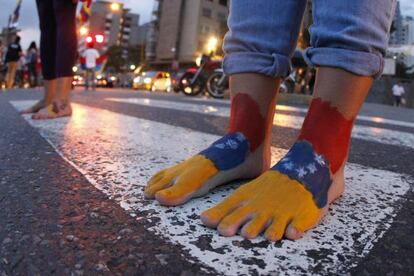Venezuelan students will not give up on their street demonstrations
Protest leader issues demands for talks with Maduro government

Hundreds of students in Venezuela marched barefoot on the streets of Caracas on Wednesday in a symbolic gesture to demonstrate “the country’s suffering” as part of the Holy Week ceremonies across the nation.
Despite the headway made in ongoing talks between President Nicolás Maduro and the opposition in the hope of finding solutions to the political and social crisis, student leaders, who have not taken part in the discussions, vowed to maintain their anti-government protests on the streets.
Maduro has criticized university leaders for not sitting in with the opposition for the talks, which on Tuesday resulted in three preliminary agreements.
But the students have put forth their own set of demands: they want a formal invitation from the government to join the talks; their representatives will be chosen by an election carried out among their members; the dialogue must be mediated by a Vatican representative and the Venezuelan ambassador to the Holy See; and the meetings must be broadcast live on television.
The first round of talks between Maduro and opposition leaders was transmitted live for six hours and filled with both sides leveling accusations against one another. Three preliminary agreements came out of the second meeting, which was held behind closed doors on Tuesday.
Students want the meetings broadcast live on television
The government and the opposition decided to broaden a truth panel of National Assembly deputies that Maduro wants to create to include well-known personalities. The two sides also agreed to allow an independent medical team to examine a jailed former police inspector, Simón Simonovis, who the opposition claims is a political prisoner. At the same time, the opposition has agreed to cooperate with the government in a security plan in neighborhoods, municipalities and states where members of the dissenting parties govern.
The talks are expected to continue next week.
One of the goals of the government is to quell the unrest that has rocked the country since nationwide protests formally got underway on February 12 with a call by now-jailed opposition leader Leopoldo López for demonstrations to demand Maduro’s resignation. At least 41 people have died and more than 600 people have been injured in the violence.
The Maduro government had hoped the demonstrations would subside with the long Easter Weekend holiday but the students used the Holy Week celebrations in the capital to maintain the momentum of their protests.
“As part of the traditions held at this time when people make promises we are marching barefoot for the problems and sufferings of this country,” wrote student leader Juan Requesens on his Twitter account.
Tu suscripción se está usando en otro dispositivo
¿Quieres añadir otro usuario a tu suscripción?
Si continúas leyendo en este dispositivo, no se podrá leer en el otro.
FlechaTu suscripción se está usando en otro dispositivo y solo puedes acceder a EL PAÍS desde un dispositivo a la vez.
Si quieres compartir tu cuenta, cambia tu suscripción a la modalidad Premium, así podrás añadir otro usuario. Cada uno accederá con su propia cuenta de email, lo que os permitirá personalizar vuestra experiencia en EL PAÍS.
¿Tienes una suscripción de empresa? Accede aquí para contratar más cuentas.
En el caso de no saber quién está usando tu cuenta, te recomendamos cambiar tu contraseña aquí.
Si decides continuar compartiendo tu cuenta, este mensaje se mostrará en tu dispositivo y en el de la otra persona que está usando tu cuenta de forma indefinida, afectando a tu experiencia de lectura. Puedes consultar aquí los términos y condiciones de la suscripción digital.








































